Lawmakers In Iran Warn Against Scrapping Cheap Dollars For Key Imports
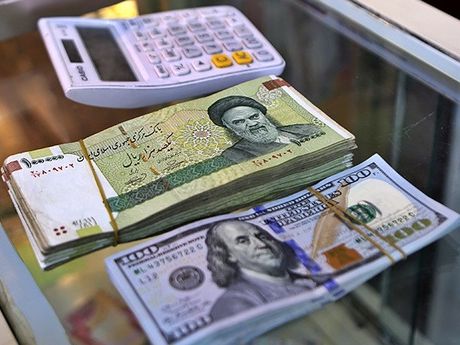
Several members of Iran’s parliament have warned that scrapping cheap government dollars for imports of essential goods can lead to even higher prices in soon.

Several members of Iran’s parliament have warned that scrapping cheap government dollars for imports of essential goods can lead to even higher prices in soon.
President Ebrahim Raisi’s government has announced plans to stop providing dollars at a seven-fold cheaper exchange rate to importers of essential food staples, animal feed and possibly some medicines, as it faces a revenue crunch amid continuing US sanctions.
The special exchange rate was introduced in 2018 to control inflation when the United States pulled out of the Obama-era nuclear agreement known as JCPOA and imposed crippling sanctions on the Islamic Republic.
However, media and politicians have charged that the cheap dollars led to large-scale corruption as individuals and companies pretended to be importing essential goods while either speculating in the currency market or importing luxury goods.
It is still not clear if the government wants to completely scrap the cheap import dollars, which is essentially a subsidy or maintain support for animal feed and medicines. Prices have been rising alarmingly, leading to warnings of social unrest.
Iran is engaged in talks to resolve its nuclear dispute with the West, which would remove US sanctions, but so far months of negotiations have not led to an agreement.
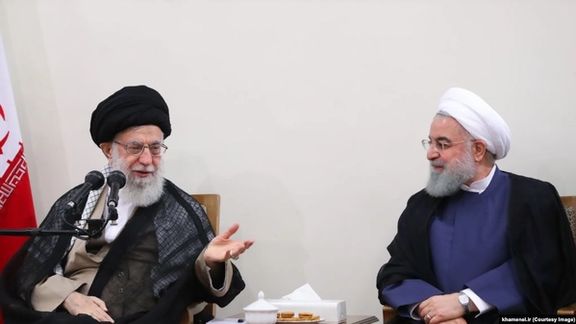
Iran’s Supreme Leader Ali Khamenei has met ex-president Hassan Rouhani, apparently for the first time since Rouhani left office August after completing his second term.
The meeting was disclosed by Mohammad Mohajeri, an editorial-board member of Khabar Online website, in a Sunday tweet. "Even if no news gets out about the content of the recent one-hour meeting of Hassan Rouhani with the Supreme Leader, the news itself bears an important message for politicians, whether [they belong to the] right, or left, or are hardliners, etc.," Mohajeri noted.
Mohajeri's tweet was immediately picked up by several publications and social-media pundits ready to pronounce the encounter a success or disappointment for Rouhani.
Some media detected a possible signal that Khamenei would appoint Rouhani to a leading position, such as chairman of the Expediency Council, a post assigned to Akbar Hashemi Rafsanjani after he stood down as president in 1997 and currently held by Sadegh Larijani, the former chief justice.
Under fire
Others saw the meeting as the leader recognizing the work of Rouhani, who has been under fire from principlists in government and parliament in recent weeks, with some parliamentarians arguing he should be put in trial.
Mohajeri did not give a date for the meeting. Javad Emam, a reformist politician, told the Iranian Labour News Agency (ILNA) that “sources close to Rouhani” had spoken of a meeting "a few weeks ago." Emam said to ILNA that the former president had told “friends” he was “very pleased with the meeting with the leader and their talks.”
Emam further suggested that the meeting − which he claimed Rouhani's critics had tried to prevent − could have related to talks in Vienna to revive Iran’s 2015 nuclear deal, the Joint Comprehensive Plan of Action (JCPOA). Rouhani regarded the agreement as the first step to a wider expansion of cooperation with European powers but was stymied when the United States left the agreement in 2018 and imposed ‘maximum pressure’ sanctions.
"The gentlemen [in power now] admit that the experiences gained from the previous talks [under Rouhani] are now being used and are very useful,” Emam said.
Drained coffers
Ali Hassanloo, editor of the reformist Eslahat Press website tweeted Sunday said Khamenei had not offered Rouhani a new position: "Firstly, Rouhani had requested the meeting with the Leader. And it wasn't a good meeting either and Mr Khamenei criticized him for the conditions in which the government was handed over [to new president Ebrahim Raisi], particularly drained government coffers. No position was on offer either although Rouhani expected to be given the chairmanship of the Expediency Council.”
There were reports that Rouhani felt “humiliated” during Khamenei’s last meeting with outgoing ministers, in July, which lasted 17 minutes during which Khamenei offered no words of thanks but spoke only of other matters such as "the goals and fundamentals of the Revolution.” Khamenei pointed out that Rouhani had erred in "investing hope in the West and trusting it,” especially in economic policy. “You lingered there and could not progress," Khamenei reportedly said.
A similar meeting with Mahmoud Ahmadinejad and his cabinet members in 2013 lasted five hours during which Khamenei praised the outgoing government, although his relations with Ahmadinejad had long been sour.

As criticism over Iran’s proposed budget echoes in local media, a former lawmaker says the top leadership has decided to reach an agreement with the West.
Mehrdad Lahouti told Aftab News, a Tehran political website that this year’s budget is not much different from previous ones in facing a serious deficit and the country's top leadership has apparently decided to solve its issues with the West.
He was was quoted on Sunday as having said that as long as Tehran does not improve ties with the world, “we cannot be hopeful about an improvement in people’s lives.”
Meanwhile, the head of the Budget and Planning Organization, Massoud Mirkazemi has written to President Ebrahim Raisi that a 10-percent extra pay in the current budget plan cannot be met because there is no money for it.
Mirkazemi has proposed to sell assets of medical universities and the government to raise money. He has admitted that targets this year for selling government property have not been met, reducing budget revenues.
Iran has faced serious budget deficits since the United States withdrew from the Obama-era nuclear agreement known as JCPOA in 2018 and imposed sanctions that have denied tens of billions of dollars in oil revenues to the Islamic Republic.
Lahouti argued that the main sources of revenue for the proposed budget to start in March 2022 are oil exports and more taxes. The budget draft is based on the projection that Iran can export 1.2 million dollars of crude oil per day next year, but the proposition depends on lifting of US sanctions.
Tehran is currently negotiating with world powers over reviving the JCPOA, which would lift the oil sanctions, but if these talks fail or are delayed it cannot sell the expected amount of oil.
Lahouti said that in such a scenario the government has to resort to borrowing from domestic markets, but he did not mention that cash has dried out and internal capital markets cannot lend billions of dollars to the government. That means the Central Bank will resort to printing money as in past years, driving up inflation that now stands close to a 50-percent annual rate.
But the former lawmaker did highlight that the government is planning to also borrow around $5.5 billion from its foreign currency reserve fund. Information about the fund is a state secret but observers agree it has declined substantially from more than $100 billion a decade ago to perhaps less than $30 billion.
Despite the unsurmountable budgetary problems, the Raisi administration has promised 8 percent economic growth, a figure Iran has never achieved before. Lahouti said that to get to that level of growth, the country would need $65 billion in foreign investment – again a figure the Islamic Republic has not seen in its 42-year existence.
But Lahouti said he believes that the top leadership has concluded it needs to solve its problems with the West, and “that is why Iran’s negotiators are in Vienna trying to reach an agreement with the West.”
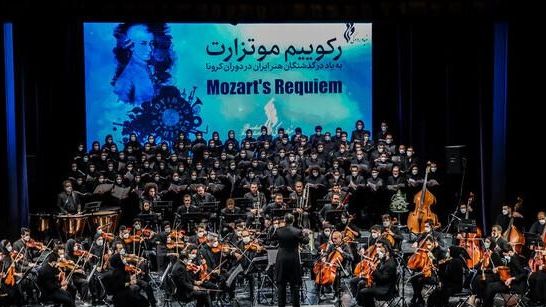
Prominent Iranian musician Hossein Alizadeh says pressure on music and musicians in Iran is incomparably higher than any other Islamic country in the world.
Alizadeh made the comments after watching a concert in Tehran’s Vahdat hall, which opened its doors to people after a 22-month hiatus due to Covid-19 restrictions.
Alizadeh highlighted that even the Taliban is gradually opening Afghanistan’s music conservatories.
He appreciated solidarity among the Iranian artists, saying, “If music is being insulted, we are all being insulted.
His criticism was apparently a reaction to recent remarks by Iranian lawmakerKazem Mousavi, who said Western musical instruments should not be allowed in an Islamic country, noting that that anyone who desired a different lifestyle should leave Iran.
According to the head of Customs Administration Iran has classified musical instruments – along with sunglasses and over a thousand other commodities -- as luxury items and banned their import.
In a meeting with Culture Minister Mohammad-Mehdi Esmaeili on Thursday, firebrand cleric Ahmad Alamolhoda criticized artists in Iranfor feeling entitled.
“They should be asked what they have done for the Islamic revolution” said the staunch supporter of Supreme Leader Ali Khamenei, who is the father-in-law of Iran's President Ebrahim Raisi.
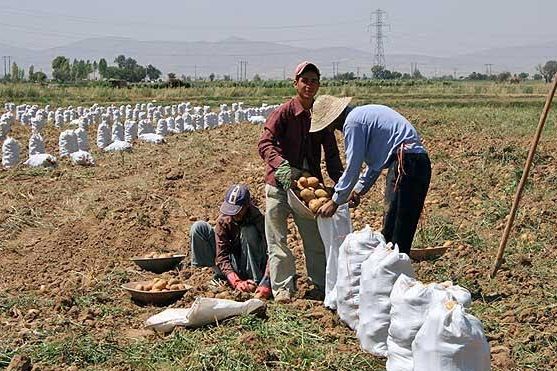
Turkmenistan and Uzbekistan have rejected large shipments of Iranian potatoes, citing dangerous contamination with agricultural pesticides and chemicals..
Heydar Sakenborji, the head of the Fruit and Vegetables Association of the city of Mashhad, in Khorasan Razavi province, told Tejarat news that the low quality of the pesticides used is the main culprit.
He elaborated that after harvest, most agricultural produce should be quarantined for a specific period for pesticides to naturally become less harmful, but pesticides used in Iran stay longer on fruits and vegetables making them toxic for humans.
"According to the investigations, pesticides used in these agricultural products are imported from China," Sakenborji said, speculating that these pesticides don’t have the required standards and quality.
He also said that in about ten days Pakistan took over these Central Asian markets from Iranian fruits and vegetables.
The Uzbek government has reportedly returned around 3,500 tons of the potatoes to Iran and destroyed other 775 tons.
Recently, a trade representative in Tehran said various countries have banned imports of Iranian fruits and vegetables due to mold or high pesticide residues, adding that India, Russia, Uzbekistan, the United Arab Emirates, Oman, Qatar and some others no longer accept certificates issued by Iran.
Iran exported $6.5 billion in agricultural products last year.
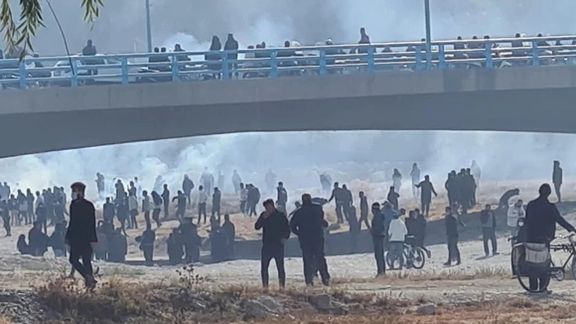
A conservative newspaper in Tehran warned on Sunday that if the government’s proposed new budget is adopted it might lead to a “major social explosion.”
"If the government's budget bill for the next Iranian year, [starting late March] is implemented, it will create a lot of problems for the people and might lead to a major social explosion that cannot be controlled," Jomhuri Eslami (Islamic Republic) daily wrote in an editorial. The paper called on parliament to amend the bill.
In November 2019, a government decision to increase fuel prices led to immediate street unrest, put down by security forces who killed hundreds of people. As a result, the regime’s legitimacy took a big blow.
The daily said that the government should not increase taxes and should continue to subsidize essential commodities by allocating cheap foreign currency for their import to prevent further inflation.
The leading conservative paper charged that those who wrote the budget bill failed to understand the importance of these points because they do not come from the low-income classes and do not know about the impact of a devalued national currency on people's livelihood.
Jomhouiri Eslami further added that the new taxation regulations stipulated in the budget bill will lead to a revolt.The daily suggested that the government should avoid allocating budget to municipalities and to tens of useless organizations.
Iranian economists and media have often criticized the governments for allocating hefty budgets to the seminaries and propaganda organizations whose only function is to convince the people that the government's ideology can lead to their salvation.
Meanwhile, reformist newspaper Sharq in a report on Saturday reminded that President Ebrahim Raisi in his latest televised interview on December 5 said, "We are not going to surprise the people by sudden hikes in prices." The paper wrote despite the president’s statement price continued to increase since he took office in August.
Sharq said that given the government's inability to control prices, it is likely that the people will surprise Raisi. This was a clear allusion to the possibility of protests in Iran because of rising inflation as many Iranian analysts have warned.
Iran’s inflation began to rise dangerously after the United States pulled out of the 2015 nuclear deal and imposed sanctions in 2018. Without oil export revenues, the government is facing a serious budget shortfall. The currency rial has fallen eightfold since early 2018.
Last week, once again Raisi called on his economic team to make sure that the prices do not go up as people prepared to celebrate a pre-Islamic feast on the longest night of the year, Yalda, on December 21. But press and social media reports indicated that food shopping was reduced to a quarter of what it was last year.
Sharq reminded Raisi that ordering his managers to lower the prices is not likely to work. "He still cannot believe that he is the president and in charge of managing the economy. That is why he keeps issuing orders to others instead of taking action to correct the situation," the paper quoted social media users as saying.
Sharq also pointed out that only three days after Raisi promised on live TV that he would not surprise the people, the price of Iranian-made cars went up by 100 to 500 million rials each. This further discredited Raisi because the cars are being produced by or in partnership with the government. Sharq quoted social media users as saying that "The economic Mafia made the president look like a fool.”